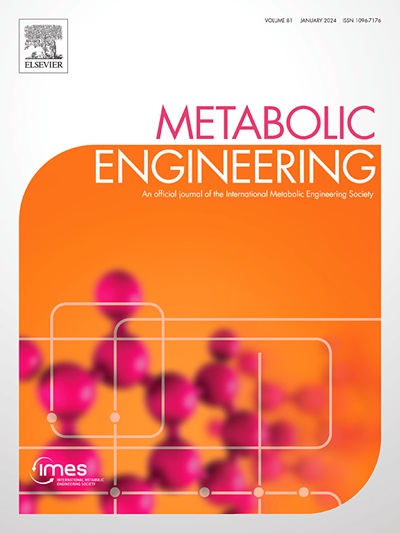Systematic rewiring of Bacillus subtilis for efficient de novo biosynthesis of the neuroprotectant cytidine-5′-diphosphocholine
IF 6.8
1区 生物学
Q1 BIOTECHNOLOGY & APPLIED MICROBIOLOGY
引用次数: 0
Abstract
Cytidine-5′-diphosphocholine (CDP-choline) is a crucial neuroprotective agent. Current industrial production relies on chemical and enzymatic methods that face inherent sustainability challenges and share a dependence on the costly precursor, cytidine monophosphate (CMP). Here, we report the systems metabolic engineering of Bacillus subtilis for the efficient, de novo biosynthesis of CDP-choline from glucose, completely obviating the need for CMP. A synthetic pathway was first established by introducing heterologous choline kinase and phosphocholine cytidylyltransferase. Subsequently, a multi-module engineering strategy was implemented, focusing on enhancing precursor supply and redirecting carbon metabolism. This involved systematically optimizing choline uptake by overexpressing the transporter OpuD and deleting the transcriptional repressor opcR, fortifying the cytidine triphosphate (CTP) pool by overexpressing feedback-resistant CTP synthase gene pyrGE156K, and deleting the transcriptional repressor pyrR along with other pyrimidine nucleotide consumption genes, and channeling carbon flux towards the TCA cycle by reducing pyruvate and malate consumption. The final engineered strain achieved a titer of 4.79 ± 0.24 g/L CDP-choline in a 5 L fed-batch bioreactor, with a high specific yield of 149.0 ± 5.8 mg/g DCW. Notably, the process exhibited a highly advantageous intracellular accumulation of 92.7 %, which simplifies downstream purification. This study represents the first successful demonstration of CDP-choline production from simple sugars in a microbial host, establishing a robust and economically competitive platform for its industrial manufacture.

枯草芽孢杆菌系统重新布线,有效地重新合成神经保护剂胞苷-5'-二磷酸胆碱。
胞苷-5′-二磷酸胆碱(cdp -胆碱)是一种重要的神经保护剂。目前的工业生产依赖于化学和酶的方法,这些方法面临着固有的可持续性挑战,并且依赖于昂贵的前体,单磷酸胞苷(CMP)。在这里,我们报道了枯草芽孢杆菌的系统代谢工程,以有效地从葡萄糖中重新合成cdp -胆碱,完全消除了对CMP的需要。通过引入外源胆碱激酶和磷酸胆碱胞基转移酶,初步建立了一条合成途径。随后,实施了多模块工程策略,重点是增加前体供应和重定向碳代谢。这包括通过过表达转运体OpuD和删除转录抑制因子opcR来系统地优化胆碱摄取,通过过表达反馈抗性CTP合成酶基因pyrGE156K来强化三磷酸胞苷(CTP)库,并删除转录抑制因子pyrR和其他嘧啶核苷酸消耗基因,并通过减少丙酮酸和苹果酸消耗来引导碳通量进入TCA循环。在5 L补料间歇式生物反应器中,最终工程菌株的滴度为4.79±0.24 g/L,比产率为149.0±5.8 mg/g DCW。值得注意的是,该工艺具有92.7%的胞内富集率,简化了下游纯化。这项研究首次成功地展示了在微生物宿主中由单糖生产cdp -胆碱,为其工业生产建立了一个强大的、具有经济竞争力的平台。
本文章由计算机程序翻译,如有差异,请以英文原文为准。
求助全文
约1分钟内获得全文
求助全文
来源期刊

Metabolic engineering
工程技术-生物工程与应用微生物
CiteScore
15.60
自引率
6.00%
发文量
140
审稿时长
44 days
期刊介绍:
Metabolic Engineering (MBE) is a journal that focuses on publishing original research papers on the directed modulation of metabolic pathways for metabolite overproduction or the enhancement of cellular properties. It welcomes papers that describe the engineering of native pathways and the synthesis of heterologous pathways to convert microorganisms into microbial cell factories. The journal covers experimental, computational, and modeling approaches for understanding metabolic pathways and manipulating them through genetic, media, or environmental means. Effective exploration of metabolic pathways necessitates the use of molecular biology and biochemistry methods, as well as engineering techniques for modeling and data analysis. MBE serves as a platform for interdisciplinary research in fields such as biochemistry, molecular biology, applied microbiology, cellular physiology, cellular nutrition in health and disease, and biochemical engineering. The journal publishes various types of papers, including original research papers and review papers. It is indexed and abstracted in databases such as Scopus, Embase, EMBiology, Current Contents - Life Sciences and Clinical Medicine, Science Citation Index, PubMed/Medline, CAS and Biotechnology Citation Index.
 求助内容:
求助内容: 应助结果提醒方式:
应助结果提醒方式:


